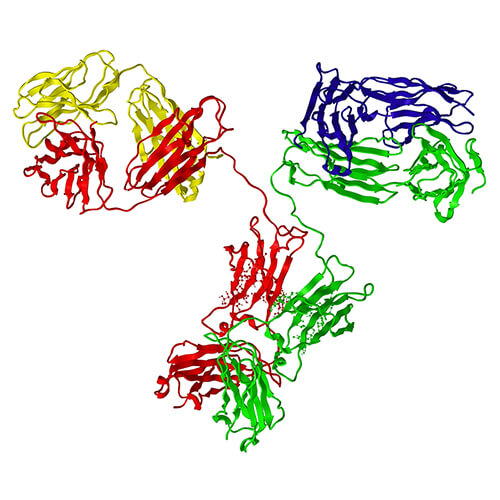Immunoglobulin A (IgA) exits in monomeric and dimeric form. Its dimeric form is more prevalent. Secretory IgA (sIgA) is mainly in the mucus secretions, including tears, saliva, sweat, colostrum, and secretions from the genitourinary tract, gastrointestinal tract, prostrate, and respiratory epithelium. It plays a crucial role in the immune function of mucus membranes. IgA represents up to 15% of total immunoglobulins produced throughout the body. IgA deficiency is linked to autoimmune health problems and allergic reactions. Anti-Human IgA can be used to diagnose problems concerning the immune system, intestines, and kidneys. It is also used to evaluate autoimmune conditions, such as rheumatoid arthritis, lupus, and celiac disease. Kids born with low levels of IgA are exposed to an increased risk of developing an autoimmune condition, infections, asthma, and allergies. Anti-Human IgA (α-chain specific) antibody is used for the development and manufacturing of various qualitative and quantitative assays based on RID, IEP, ELISA, latex enhanced immunoturbidimetric assays, ouchterlony double diffusion, western blot, and precipitin assay, intending to estimate IgA in various disease conditions in humans.
Anti-Human IgA
Product Code : 00-ABD-MM-IgA-001, 00-ABD-MM-IgA-002, 00-ABD-MM-IgA-003
Available products:
| Product Name (New) | Product Code | Grade |
|---|---|---|
| Goat Anti-Human IgA, Whole Serum | 00-ABD-MM-IgA-001 | Whole Serum |
| Goat Anti-Human IgA, Fractionated | 00-ABD-MM-IgA-002 | Fractionated |
| Goat Anti-Human IgA, Purified | 00-ABD-MM-IgA-003 | Protein-G Affinity Purified |
Specifications:
| Test parameters | Acceptance Criteria |
|---|---|
| Product Code | 00-ABD-MM-IgA-001 |
| Host | Goat |
| Immunogen | Human IgA-α chain |
| Grade | Whole Serum |
| Physical Appearance | Straw to brownish yellow clear liquid without any suspended particles |
| Titre (Reverse Single Radial Immunodiffusion) | >8 mg/ml |
| Shelf life | 3 years |
| Buffer details* | Tris Saline with 15mM NaN3, pH 7.4 ± 0.2 |
| Total Protein (Biuret Method) | 50 to 150 mg/ml |
| Cholesterol(CHOD Enzymatic method) | ≤50 mg/dl |
| Specificity (Immunoelectrophoresis) | Monospecific to IgA when reacted with pooled human plasma & 2X normal human serum |
| Specificity (Ouchterlony) | Monospecific when reacted with normal human Serum |
| pH | 7.0 to 8.0 |
| Storage conditions | 2 to 8ºC |
| Test parameters | Acceptance Criteria |
|---|---|
| Product Code | 00-ABD-MM-IgA-002 |
| Host | Goat |
| Immunogen | Human IgA-α chain |
| Grade | Fractionated |
| Physical Appearance | Clear, off white to pale yellow liquid without any suspended particles |
| Titre (Reverse Single Radial Immunodiffusion) | > 6 mg/ml |
| Shelf life | 3 years |
| Buffer details* | Saline with 15mM NaN3 |
| Total Protein (Biuret Method) | 25 to 150mg/ml |
| Total Protein by OD 280 nm | 60 mg/ml |
| Specificity (Immunoelectrophoresis) | Monospecific to IgA when reacted with pooled human plasma & 2X normal human serum |
| pH | 7.0 to 8.0 |
| Storage conditions | 2 to 8ºC |
| Test parameters | Acceptance Criteria |
|---|---|
| Product Code | 00-ABD-MM-IgA-003 |
| Host | Goat |
| Immunogen | Human IgA-α chain |
| Grade | Protein-G Affinity Purified |
| Physical Appearance | Clear, colourless liquid without any suspended particles |
| Shelf life | 3 years |
| Buffer details* | Phosphate buffer saline with 15mM NaN3, pH 7.2 ± 0.2 |
| Total Protein by OD 280 nm | 0.5 to 20 mg/ml |
| Specificity (Immunoelectrophoresis) | Monospecific to IgA when reacted with pooled human plasma & 2X normal human serum |
| Specificity (Ouchterlony) | Monospecific when reacted with normal human Serum |
| pH | 7.0 to 8.0 |
| Storage conditions | 2 to 8ºC |
*Buffer composition can be customised as per the customer requirements. Product can be further customised as per the specific requirements.
For research use or further manufacturing purposes only
